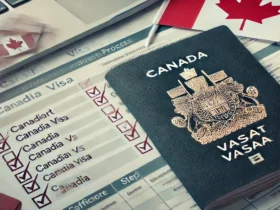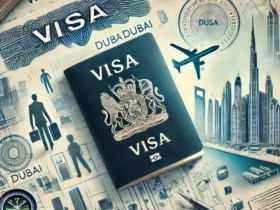Immigration violations are breaches of a country’s immigration laws, committed by individuals who are either living in or attempting to enter the country. These violations can range from entering a country illegally to overstaying a visa or engaging in unauthorized employment. Governments have immigration systems in place to regulate who can enter, how long they can stay, and under what conditions they can live or work within the country. When these systems are bypassed or ignored, it results in immigration violations.
In this blog post, we will dive deep into what constitutes an immigration violation, the various types of violations, the consequences of these violations, and how individuals can avoid falling foul of immigration laws.
Types of Immigration Violations
Immigration violations can be classified into several categories. The most common types of violations include illegal entry, visa overstays, unauthorized work, document fraud, and misrepresentation.
1. Illegal Entry
Illegal entry occurs when a person enters a country without the necessary legal permission, such as a visa or entry clearance. This can happen when individuals cross borders without passing through official immigration control or use forged documents to enter the country. Illegal entry is considered a serious offense and can result in deportation, fines, or even imprisonment, depending on the country’s immigration laws.
2. Visa Overstays
Visa overstays happen when individuals enter a country legally but remain in the country beyond the expiration of their visa. For instance, a person may enter the United States on a tourist visa, which typically allows a stay of six months, but remains for several months or years after the visa expires. Overstaying a visa is a violation of immigration law and can lead to penalties, including deportation and restrictions on future entry into the country.
3. Unauthorized Work
Another common immigration violation is engaging in unauthorized work. Most countries issue specific types of visas that allow individuals to work legally. However, if a person enters the country on a visa that does not permit employment—such as a tourist or student visa—and takes up a job, this constitutes an immigration violation. Working without authorization can lead to severe consequences for both the employee and the employer, including fines, deportation, and bans on future work visas.
4. Document Fraud and Misrepresentation
Immigration systems rely on accurate documentation and truthful representation of facts. Document fraud refers to the use of fake documents to gain entry into a country or secure legal status. This can include counterfeit passports, visas, or work permits. Misrepresentation involves providing false or misleading information during the immigration process, such as lying about one’s criminal history or marital status. Both document fraud and misrepresentation are serious offenses that can lead to permanent bars from the country or criminal prosecution.
Consequences of Immigration Violations
The consequences of violating immigration laws can be far-reaching and impact not only the individual but also their family and future prospects in the country. These consequences vary based on the nature and severity of the violation and the country’s immigration policies.
1. Deportation
Deportation is one of the most common consequences of immigration violations. When someone is found to be in breach of immigration laws, the government may initiate removal proceedings to expel them from the country. Deportation can be immediate in some cases, especially when individuals are caught entering illegally or engaging in criminal activities.
2. Fines and Penalties
In many cases, individuals who violate immigration laws may face monetary fines or penalties. These can be imposed in cases of visa overstays, illegal work, or other violations. The amount of the fine varies depending on the country and the severity of the offense.
3. Travel Bans
In addition to deportation, individuals who violate immigration laws may be barred from re-entering the country for a set period of time, or even permanently. A travel ban means the individual will not be granted a visa or entry into the country for a specified period, which can range from a few years to a lifetime, depending on the nature of the violation.
4. Criminal Prosecution
Serious immigration violations, such as document fraud, human trafficking, or organized illegal immigration schemes, may lead to criminal prosecution. Individuals involved in these activities can face jail time, heavy fines, and a permanent ban from the country. In some cases, they may also be extradited to face charges in their home country.
Common Causes of Immigration Violations
While some immigration violations are intentional, others may occur due to a lack of understanding or knowledge about immigration laws. There are several common causes of immigration violations, which include:
1. Ignorance of Immigration Laws
One of the most common causes of immigration violations is ignorance of the country’s immigration laws. Some individuals may overstay their visa without realizing it, or they may not know that their visa does not permit them to work. It is essential to understand the specific terms and conditions of your visa or entry permit to avoid unintentional violations.
2. Misleading Information from Third Parties
In some cases, individuals may fall victim to immigration fraud perpetrated by third parties, such as immigration consultants or unscrupulous employers. These parties may provide false information or encourage individuals to engage in illegal activities, such as working without authorization or using forged documents. It is crucial to seek legal advice from trustworthy sources and avoid relying on unverified information.
3. Desperation and Economic Factors
Economic hardships and lack of opportunities in an individual’s home country often push people to violate immigration laws. Some people may risk illegal entry or work without proper authorization in search of better job prospects or living conditions. While the intention is often to improve their situation, the legal consequences can be severe.
How to Avoid Immigration Violations
Avoiding immigration violations requires a clear understanding of the immigration process and strict adherence to the rules and regulations set by the government. Here are some practical tips to avoid falling foul of immigration laws.
1. Stay Informed About Immigration Policies
Immigration policies and regulations can change frequently. It is vital to stay up-to-date with the latest information about visa requirements, work permits, and other immigration laws in your country of residence. If you are unsure about any aspect of your immigration status, it is advisable to consult with an immigration lawyer or advisor.
2. Renew Visas and Permits on Time
Visa overstays are one of the most common immigration violations. To avoid this, it is important to keep track of the expiration dates of your visa or permit and apply for extensions or renewals well in advance. Many countries provide grace periods or allow individuals to apply for extensions while still in the country, but you must be aware of the deadlines and procedures.
3. Avoid Unauthorized Employment
If you are in a country on a visa that does not permit employment, do not attempt to work unless you have obtained proper authorization. Engaging in unauthorized work can lead to deportation and may affect your chances of obtaining legal status in the future. Always ensure that you have the appropriate visa or work permit before taking up employment.
4. Seek Legal Advice When in Doubt
If you are unsure about your immigration status or believe you may have violated immigration laws, it is crucial to seek legal advice immediately. Immigration lawyers can help you understand your rights and options and may be able to assist in resolving your situation before it escalates into deportation or other severe consequences.
The Role of Governments in Preventing Immigration Violations
Governments play a critical role in preventing and addressing immigration violations. Immigration authorities monitor borders, review visa applications, and enforce immigration laws within the country. In addition to enforcement, governments often run awareness campaigns to educate immigrants about their rights and responsibilities.
1. Border Security and Monitoring
One of the primary ways that governments prevent illegal entry and other immigration violations is through border security and monitoring. This includes the use of border patrols, surveillance technology, and international cooperation to prevent unauthorized entry.
2. Visa and Work Permit Regulations
Governments regulate the issuance of visas and work permits to control who can enter the country and for what purpose. These regulations are essential for managing immigration and ensuring that individuals adhere to the terms of their stay.
3. Education and Public Awareness Campaigns
Some governments run public awareness campaigns aimed at educating immigrants about the rules and regulations they must follow. These campaigns may include information on visa renewals, work permit requirements, and the consequences of immigration violations.
Conclusion
Immigration violations are serious offenses that can have long-lasting consequences for individuals and their families. Whether intentional or accidental, these violations can result in deportation, fines, travel bans, and even criminal prosecution. It is essential for individuals to familiarize themselves with the immigration laws of their host country and ensure they follow the rules to avoid legal issues.
By staying informed, renewing visas on time, and seeking legal advice when necessary, immigrants can protect themselves from the negative consequences of immigration violations. Governments, too, have a role to play in providing clear guidelines and education to ensure compliance with immigration laws.
In a globalized world where people are constantly moving across borders, understanding and respecting immigration laws is crucial for maintaining legal status and ensuring a smooth, lawful stay in any country.





